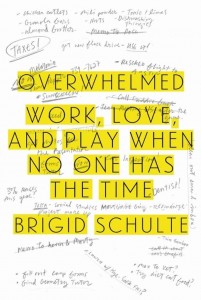 If someone told you now that you have more leisure time than ever, would you believe them? Or would you, as working mother Brigid Schulte did, want to say, “You are out of your flipping mind!”
If someone told you now that you have more leisure time than ever, would you believe them? Or would you, as working mother Brigid Schulte did, want to say, “You are out of your flipping mind!”
A time-use researcher told her in 2010 that Americans have 30 more hours of leisure time a week than they did 20 years ago. That’s not what it felt like to Schulte at the time she interviewed John Robinson for The Washington Post Magazine. “You have no idea what it feels like,” she wanted to say to him, a divorced man with grown children, who lived alone. As a working parent, “you feel like your hair is on fire, and you’re walking on hot coals.”
From an interview from her home office this week, she told me, “I was angry, and I wanted to prove him wrong.”
That skepticism led to “Overwhelmed: Work, Love and Play When No One Has the Time,” which jumped to No. 10 on The New York Times best seller list this week.
More accurate to her experience was “contaminated time” – when outwardly you may be doing something that is technically not employed, paid work, the presumed opposite of leisure. But in fact, your mind is consumed with a never-ending to-do list.
“I love that term,” she says. “It’s when you have so much on your mind, you have so much crashing in your brain, that you’re neither here nor there. … You’re thinking about something you didn’t do. … I’m doing this, but I feel like I should be doing that. I forgot about this.”
And women are more “contaminated” than men, in a way of speaking.
“Men were worrying, but typically only in the work area,” Schulte says. “Women were juggling all the same worries and thoughts about work, and about home.”
Hungry for more
That led to “Overwhelmed,” and a phenomenal response that has catapulted her to the front lines of the work-life balance conversation. “People seem really hungry for this conversation. We’ve been living in pain and rage for a long time.”
Last week she told Terry Gross on NPR’s “Fresh Air” that she thinks this country is unfair to mothers. “I think that’s another part that makes leisure more difficult for mothers, particularly working mothers but stay-at-home mothers as well – our expectations. The standards have never been higher.”
The combination of “crazy mothering expectations” and few family-friendly policies makes for a culture that’s harsh toward mothers. “We are so ambivalent about whether mothers should even work. We ask questions like, ‘Do you think a working mother can have a warm relationship with her child?’ We plant those seeds of doubt. We don’t ask that about men.”
In her book, she takes a good, hard look at how we arrived at the point when men, women, single, married, young and old are coming to her and saying “you climbed inside my head and looked at my life.”
What she found that was particular to women was that what leisure time women have is so contaminated with their responsibilities it is hard for them to fully experience it.
Historically, women have tended to experience time in a more fragmented way, while men have longer stretches when they are doing a single task, what’s called flow. “You have a long history of women not having access to that (kind of) time,” Schulte says.
It is true that American mothers are spending as much or more time with their children than mid-century mothers, she adds, but what has fallen off is time with adults – particularly one’s spouse and friends.
Another big revelation came when she delved into research from the 1990s that showed that women around the globe felt they didn’t deserve leisure. “They felt they had to earn it.”
Not a failure
Too long has work-life balance been dismissed as a mommy issue. “I wanted to take as hard a look at this issue as we do with war,” she says, with “the skepticism of a reporter.”
Hearing that so many people she spoke with wanted her to get to the bottom of the problem juiced her to keep probing. “This is not an epidemic of personal failure,” she says. “There’s something structural going on.”
And that leads to the American workplace. “Our workplaces are governed by outdated thinking,” she says.
While she agrees that managing your human capital is key to remaining visible in the workplace while juggling family and home, she says we’ve got to give up the idea that the ideal worker is the one who comes in early and leaves late and eats lunch at his or her desk.
“So we don’t think that mothers are the best workers. We don’t think they are smart,” she says.
And nor we do think highly of men who leave to pick up their kids. We label them wimps, she says. And women tend to judge those men more harshly than their male peers do.
In Denmark, if you work long hours, you’re not seen as heroic, you’re seen as deficient. You’re asked why you couldn’t get your work done on time. She addresses that issue in her chapter, “Do Danes Do It Better?”
Here, in America
So what can we do, short of marrying a Dane? Schulte starts the conversation with what we, as a country, care about, which is productive, meaningful work and happy, thriving families. In America, “everybody is overworking,” she says. “And we’re not doing our best work. It’s making us sicker and stupider. In a knowledge economy, you want fresh brains.”
Neuroscience is showing us more about what makes our brains most productive, and that means more breaks – and less contaminated time. “So we’re making the workplace not just family-friendly but life-friendly and human-friendly.”
The other motivator for change is the sharp drop in the birth rate since the economic downturn. “If we’re creating a society where people find it too difficult to have children, that’s a problem.”
Still, she believes that there’s much that individuals can do right now, to make changes in themselves, and that points to present-moment mindfulness, chunking of time and working in pulses – short, intensive bursts of concentrated work. And taking time to pause, disrupting the cycle of breathlessness.
“To live in the moment, in the present moment, requires an act of will,” she says.
Carolyn Flynn, editor, Sage magazine
Published March 23, 2014 at abqjournalsage.com.
Carolyn Flynn is the editor of Sage magazine, published quarterly in print and daily online at abqjournalsage.com. Find Sage at facebook.com/sageabqjournal and “like” the page to get it in your newsfeed. Contact the editor at 505-823-3870, sage@abqjournal.com or through Facebook.
Overcoming overwhelm
 Brigid Schulte, author of “Overwhelmed: Work, Love and Play When No One Has the Time,” has found ways to take back her “contaminated” time and turn it into purer, focused time, which feels more like leisure and sounds a lot like present-moment mindfulness. “Overwhelm never goes away,” she says. “It’s how you navigate through it.” She calls it, “finding time serenity.”
Brigid Schulte, author of “Overwhelmed: Work, Love and Play When No One Has the Time,” has found ways to take back her “contaminated” time and turn it into purer, focused time, which feels more like leisure and sounds a lot like present-moment mindfulness. “Overwhelm never goes away,” she says. “It’s how you navigate through it.” She calls it, “finding time serenity.”
⋄ The present. Using mindfulness, such as breath awareness or a single point of focus, keep your thoughts to the present moment only.
⋄ Chunks. Chunk together periods that are only work or only errands.
⋄ Pulses. Schedule short, intensive bursts of concentrated work.
⋄ Pauses. Schedule times for pausing.
⋄ A smarter to-do list. Decide what is most important, and do that first.
⋄ Self-care. Make it your priority.
⋄ Play. Make time for pure fun.
⋄ Mess. Let your house be a little dirty. “It doesn’t look like Downton Abbey,” Schulte says of her house.
⋄ Meaning. Make time for the things that are meaningful to you.
⋄ Mastery. Learning to do things well gives you confidence and serenity.
⋄ Clarity. Make ambiguity your enemy. Have a clear mission in the workplace. Set clear parameters on performance.
Overcoming overwhelm
Brigid Schulte, author of “Overwhelmed: Work, Love and Play When No One Has the Time,” has found ways to take back her “contaminated” time and turn it into purer, focused time, which feels more like leisure and sounds a lot like present-moment mindfulness. “Overwhelm never goes away,” she says. “It’s how you navigate through it.” She calls it, “finding time serenity.”
⋄ The present. Using mindfulness, such as breath awareness or a single point of focus, keep your thoughts to the present moment only.
⋄ Chunks. Chunk together periods that are only work or only errands.
⋄ Pulses. Schedule short, intensive bursts of concentrated work.
⋄ Pauses. Schedule times for pausing.
⋄ A smarter to-do list. Decide what is most important, and do that first.
⋄ Self-care. Make it your priority.
⋄ Play. Make time for pure fun.
⋄ Mess. Let your house be a little dirty. “It doesn’t look like Downton Abbey,” Schulte says of her house.
⋄ Meaning. Make time for the things that are meaningful to you.
⋄ Mastery. Learning to do things well gives you confidence and serenity.
⋄ Clarity. Make ambiguity your enemy. Have a clear mission in the workplace. Set clear parameters on performance.
